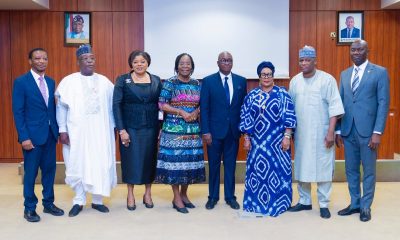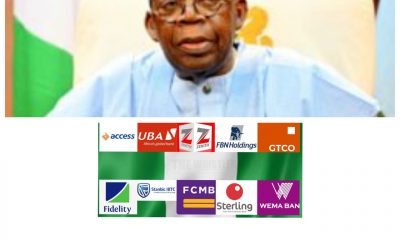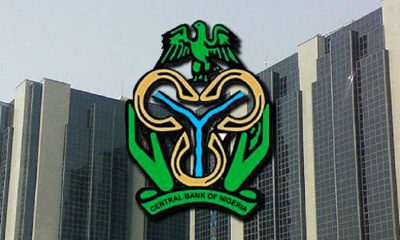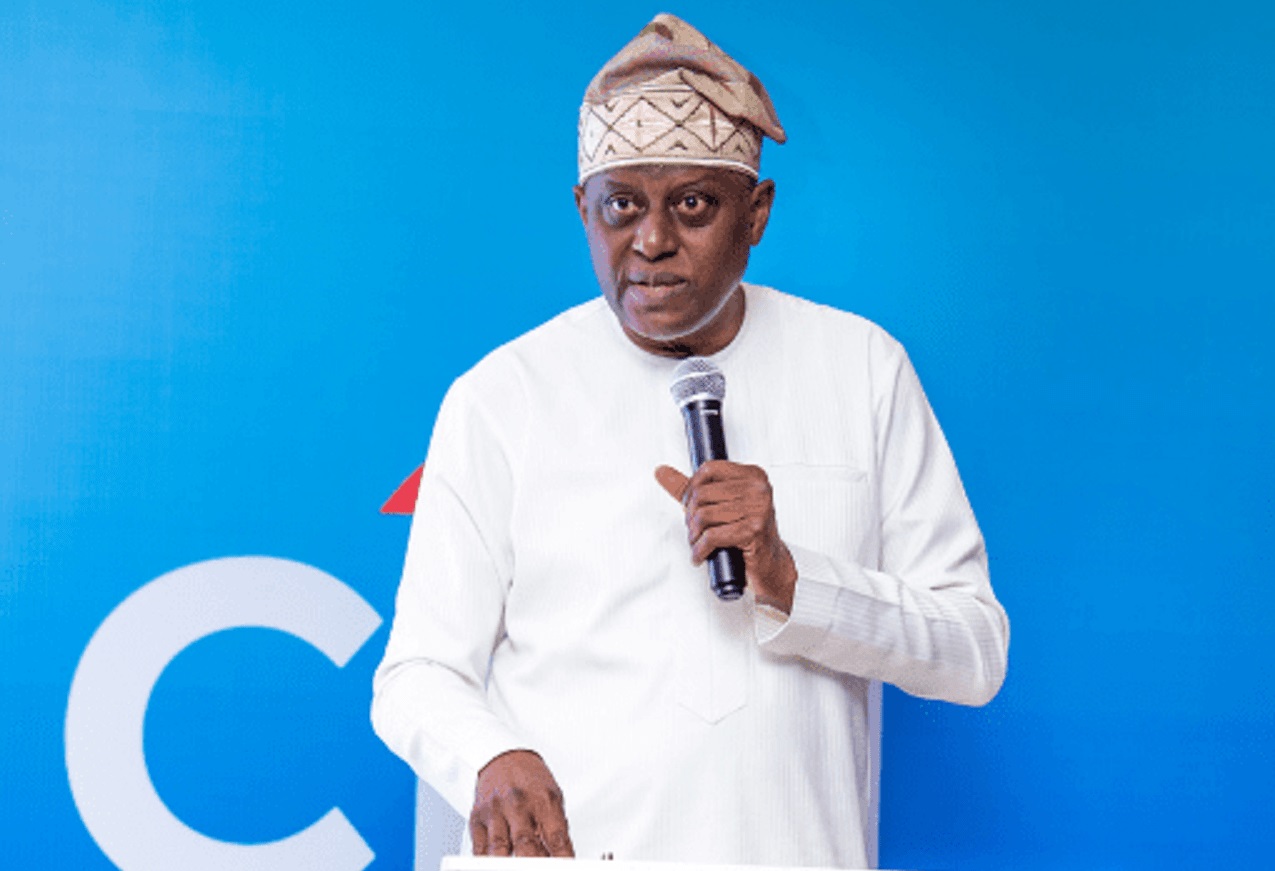Economy
CBN Anchor Borrower Programme Kicks Off in Lagos
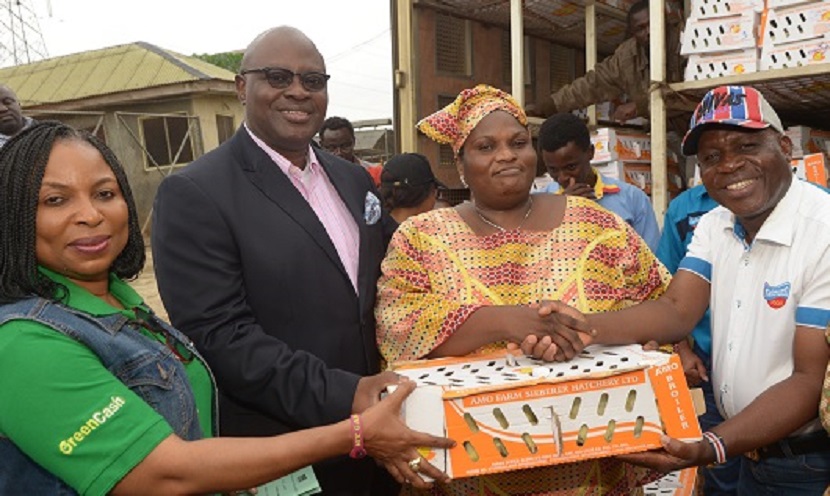
By Modupe Gbadeyanka
Ten poultry farmers registered under Nigeria’s foremost broiler out-grower scheme, natnuPreneur, have become the first beneficiaries of Central Bank of Nigeria (CBN)’s poultry Anchor Borrowers Scheme (ABP).
The farmers took delivery of 1000 birds each in a ceremony which held at Erikorodo farm settlement, Ikorodu, Lagos on Thursday, August 17, 2017.
The event had the CBN, Bank of Agriculture (BOA), the Ministry of Agriculture Lagos state, AMO Farms, Erikorodo Poultry Farmers’ Association well represented; a total of 10,000 Day Old Chicks (DOCs) were formally handed over to the beneficiaries following the delivery of 38 tonnes of feeds for the six weeks rearing period, three days prior.
While addressing newsmen shortly after the handing over ceremony, the Coordinator of natnuPreneur, Mr Gbolade Adewole expressed satisfaction at the success of the event pointing out that it is another feather added to the cap of the natnuPreneur initiative.
“This is another success we are recording here today. It is a thing of joy for us at Amo Farms to have our farmers kick start the pilot phase of this CBN initiative. It tells you that there is something we are doing right and I can assure that this scheme will be a success”.
“With the technical support and training we render farmers through our team of Animal Scientists, veterinary doctors, customer satisfaction representatives, I am sure that in the next six weeks, our farmers would have successfully reared these chicks into healthy broilers, which we’ll be buying back from them, at the agreed off-take price,” he said.
Speaking earlier, Mr Adebisi Adedeji, Head of the Development Finance Office (DFO) CBN Lagos, reiterated the apex bank’s commitment towards reducing Nigeria’s food importation and encouraging locally produced food both for consumption and export.
Mr Adebisi explained that as part of realizing the food security goal of the Federal Government, the CBN in collaboration with Amo Farm Sieberer Hatchery Limited, has engaged 33 farmers registered under the natnuPreneur out-grower scheme, in a pilot phase of broiler production.
Explaining the role of the CBN in the programme, Mr Adebisi said “This is the pilot phase for the poultry farmer’s ABP in Lagos. This might appear like a small project at the moment but we assure you that by the end of this year, there will be hundreds and if possible thousands of farmers involved in this scheme.
“The scheme will cut across other areas of agriculture, but, we are starting with poultry because, unlike others, it’s not seasonal.
“The CBN has invested a lot into this programme and we will still invest more. What we have done is to provide the farmers with the finance needed to buy the birds, the feed and other inputs necessary materials to successfully rear the birds.”
He said that as part of measures already in place to ensure the success of the scheme, a ready market has been prepared for the farmers in natnudO foods through natnuPreneur broiler out-grower scheme. He assured them that, market changes will not affect their selling price as the already agreed selling price will apply at the end of the cycle notwithstanding possible market changes.
In his words, “The Anchor, natnudO Foods, who is also the off taker, has guaranteed that they will buy off all the produce at the end of the cycle at a fixed price.
“So it’s not a situation where the farmers at the end of the day will be looking for a market or people to sell their produce to, there is a ready market for them.
“Also, price risk as a result of market changes will not affect them because; the broilers will be bought at the agreed price. So it’s a win –win situation for all the parties involved.”
He expressed optimism that in the next six weeks the DOCs would be ready for culling, and assured that it will be a successful outing.
While also addressing the farmers, the General Manager, Policy and Strategy, AMO Group, Mr Toromade Francis noted that the achievement is an addition to the success natnudO Foods has recorded with its natnuPreneur scheme.
In his words: “For us this is not the first time. So far, we have onboarded about 1,219 natnuPreneur farmers nationwide, culled over 3.8 million birds and paid over N4Billion to farmers across the country. So, this is just an addition to what we have done.”
He advised the farmers to be committed, effective and prudent while assuring them that natnudO Foods being the anchor to the programme will provide all technical support needed for them to succeed. He assured them that the chicks, feed and other inputs that have been given to them are of the highest quality.
“I assure you that, as the anchor in this programme, we will support you with all the technical assistance you require, as we assume that after six weeks, you would have been able to achieve the weight expected.
“This is a journey which is starting today and we hope that by this time next year, we should be harvesting hundreds of thousands of chickens from these farms. We have increased the capacity of our abattoirs, we have decentralized and are now processing in Port Harcourt and Kaduna just to ensure that we accommodate all the chickens that you will raise, we’re also constructing an abattoir in Uyo,” he said.
Speaking on behalf of the farmers, Captain Eka Justus, the Chairman, Erikorodo Poultry Farmers Association thanked the CBN, BOA, Lagos state ministry of Agriculture and AMO Farms for the opportunity and promised that the farmers will not disappoint them.
“We want to express our joy at this opportunity because, to be selected amongst all the farms in Lagos State as the first beneficiary of this programme is an honour and privilege. We say a big thank you to CBN, BOA, Ministry of Agriculture, Amo Farms and natnudO Foods. We assure you that we will not let you down” he said.
The Anchor Borrowers’ Programme (ABP) was established by the CBN and launched by President Muhammadu Buhari (GCFR) with the intention to create a linkage between anchor companies and small holder farmers (SHFs) providing them with key agricultural commodities.
The programme thrust of the ABP is provision of farm inputs in kind and cash to small holder farmers to boost production of commodities, stabilize inputs supply to agro processors and address the country’s negative balance of payments on food.
At harvest, the SHF supplies his/her produce to the Agro-processor (Anchor) who pays the cash equivalent to the farmer’s account.
Economy
FG Targets Credit Access For 50% Workers By 2030

By Adedapo Adesanya
The Vice President, Mr Kashim Shettima, inaugurated the Board of the Nigerian Consumer Credit Corporation (CREDICORP) and gave a 50 per cent access target for workers, saying consumer credit was critical to Nigeria’s ambition of becoming a one-trillion-dollar economy by 2030.
According to him, President Bola Tinubu established the CREDICORP to build a trusted credit infrastructure, provide catalytic capital to lower borrowing costs, and help Nigerians overcome long-standing cultural resistance to credit.
Speaking on Thursday in Abuja when he inaugurated the board on behalf of the President, the Vice President, in a statement by his spokesman, Mr Stanley Nkwocha, said that the quality of life of Nigerians cannot improve without closing the gap between access to capital and human dignity.
“A civil servant who earns honestly does not have to chase sudden wealth just to buy a vehicle, or save for ten years to buy one. A young professional should not remain in darkness simply because solar power must be paid for all at once,” the Vice President said.
VP Shettima disclosed that in just one year of operations, CREDICORP has disbursed over ₦37 billion in consumer credit to more than 200,000 Nigerians, with over half of them accessing formal credit for the first time.
The Vice President said the organisation was specifically tasked with building credit infrastructure to bridge the trust gap between lenders and borrowers, providing wholesale capital and credit guarantees through its portfolio company.
“Ultimately, these critical jobs of CREDICORP will enable access to consumer credit to at least 50 per cent of working Nigerians by 2030,” he said.
The Vice President explained that the new board’s role was not ceremonial as they are custodians of the organisation’s mission, adding that the long-term strength of the institution would depend on their “vigilance, integrity, sacrifice, and commitment.”
He directed Board members to uphold Public Service Rules, the Board Charter, and all applicable governance frameworks, warning that accountability and stewardship of public resources were non-negotiable.
The Chairman of CREDICORP, Mr Aderemi Abdul, expressed appreciation to President Tinubu for his vision behind the formation of CREDICORP and for the confidence reposed in them, noting that the establishment of the corporation marked an important step towards strengthening the nation’s financial architecture.
He assured President Tinubu that the board understands its responsibility and will guide the institution to deliver meaningful benefits to Nigerians.
For his part, Mr Uzoma Nwagba, Managing Director/CEO of CREDICORP, recalled watching President Tinubu say 20 years ago that consumer credit is one of the major tools that will improve the lives of Nigerians.
He noted that over the past 18 months, the institution has benefited more than 200,000 Nigerians, including students.
He assured that the presidential vision behind CREDICORP would not be taken lightly, as the team considers their appointments a unique, once-in-a-lifetime opportunity.
Other members of the board inaugurated include Mrs Olanike Kolawole, Executive Director, Operations; Mrs Aisha Abdullahi, Executive Director, Credit and Portfolio Management; Mr Armstrong Ume-Takang (MD, MoFI), Representative of MoFI; Mrs Bisoye Coke-Odusote (DG, NIMC), Representative of NIMC; and Mr Mohammed Naziru Abbas, Representative of FMITI.
Others are Mr Marvin Nadah, Representative of FCCPC; Mrs Chinonyelum Ndidi, Representative of the Federal Ministry of Finance; Mr Mohammed Abbas Jega, Independent Director; and Mrs Toyin Adeniji, Independent Director.
Economy
NASD OTC Exchange Rallies 0.23% as Nipco Leads Six Advancers

By Adedapo Adesanya
Six price gainers helped the NASD Over-the-Counter (OTC) Securities Exchange retain its stay in green territory after a 0.23 per cent appreciation on Thursday, February 26.
The price gainers were led by Nipco Plc, which added N25.00 to close at N278.00 per share compared with the previous day’s N253.00 per share, NASD Plc rose by N5.13 to N56.41 per unit versus N51.28 per unit, FrieslandCampina Wamco Nigeria Plc expanded by N2.24 to N102.44 per share from N100.00 per share, Afriland Properties Plc grew by 88 Kobo to N18.88 per unit from N18.00 per unit, 11 Plc increased by 35 Kobo to N277.00 per share from N276.65 per share, and Lagos Building Investment Company (LBIC) Plc gained 27 Kobo to close at N3.75 per unit versus N3.48 per unit.
On the flip side, Central Securities Clearing System (CSCS) Plc lost N1.75 to sell at N68.25 per share versus N70.00 per share, and Geo-Fluids Plc depreciated by 2 Kobo to N3.25 per unit from N3.27 per unit.
The weight of the advancers fortified the NASD Unlisted Security Index (NSI) by 9.21 points to 4,034.46 points from 4,025.25 points, and the market capitalisation soared by N5.51 billion to N2.413 trillion from Wednesday’s N2.408 trillion.
Yesterday, the transaction value jumped by 18.8 per cent to N102.8 million from N80.7 million, and the number of deals surged by 18,8 per cent to 38 deals from 32 deals, while the transaction volume went down by 84.9 per cent to 1.3 million units from 8.7 million units.
At the close of business, CSCS Plc was the most traded stock by value (year-to-date) with 34.2 million units worth N2.04 billion, followed by Okitipupa Plc with 6.3 million units sold for N1.1 billion, and Geo-Fluids Plc with 122.1 million units valued at N478.2 million.
Resourcery Plc remained as the most traded stock by volume (year-to-date) with 1.05 billion units exchanged for N408.7 million, trailed by Geo-Fluids Plc with 122.1 million worth N478.2 million, and CSCS Plc with 34.2 million units traded for N2.04 billion.
Economy
Naira Down Again at NAFEX, Trades N1,359/$1

By Adedapo Adesanya
The Naira further weakened against the Dollar in the Nigerian Autonomous Foreign Exchange Market (NAFEX) for the fourth straight session this week on Thursday, February 26.
At the official market yesterday, the Nigerian Naira lost N3.71 or 0.27 per cent to trade at N1,359.82/$1 compared with the previous session’s N1,356.11/$1.
In the same vein, the local currency depreciated against the Pound Sterling in the same market window on Thursday by N8.27 to close at N1,843.23/£1 versus Wednesday’s closing price of N1,834.96/£1, and against the Euro, it crashed by N8.30 to quote at N1,606.89/€1, in contrast to the midweek’s closing price of N1,598.59/€1.
But at the GTBank forex desk, the exchange rate of the Naira to the Dollar remained unchanged at N1,367/$1, and also at the parallel market, it maintained stability at N1,365/$1.
The continuation of the decline of the Nigerian currency is attributed to a surge in foreign payments that have outpaced the available Dollars in the FX market.
In a move to address the ongoing shortfall at the official window, the Central Bank of Nigeria (CBN) intervened by selling $100 million to banks and dealers on Tuesday.
However, the FX support failed to reverse the trend, though analysts see no cause for alarm, given that the authority recently mopped up foreign currency to achieve balance and it is still within the expected trading range of N1,350 and N1,450/$1.
As for the cryptocurrency market, major tokens posted losses over the last 24 hours as traders continued to de-risk alongside equities following Nvidia’s earnings-driven pullback, with Ripple (XRP) down by 2.7 per cent to $1.40, and Dogecoin (DOGE) down by 1.6 per cent to $0.0098.
Further, Litecoin (LTC) declined by 1.3 per cent to $55.87, Ethereum (ETH) slipped by 0.9 per cent to $2,036.89, Bitcoin (BTC) tumbled by 0.7 per cent to $67,708.21, Cardano (ADA) slumped by 0.6 per cent to $0.2924, and Solana (SOL) depreciated by 0.4 per cent to $87.22, while Binance Coin (BNB) gained 0.4 per cent to sell for $629.95, with the US Dollar Tether (USDT) and the US Dollar Coin (USDC) closing flat at $1.00 each.
-

 Feature/OPED6 years ago
Feature/OPED6 years agoDavos was Different this year
-
Travel/Tourism10 years ago
Lagos Seals Western Lodge Hotel In Ikorodu
-

 Showbiz3 years ago
Showbiz3 years agoEstranged Lover Releases Videos of Empress Njamah Bathing
-

 Banking8 years ago
Banking8 years agoSort Codes of GTBank Branches in Nigeria
-

 Economy3 years ago
Economy3 years agoSubsidy Removal: CNG at N130 Per Litre Cheaper Than Petrol—IPMAN
-

 Banking3 years ago
Banking3 years agoSort Codes of UBA Branches in Nigeria
-

 Banking3 years ago
Banking3 years agoFirst Bank Announces Planned Downtime
-

 Sports3 years ago
Sports3 years agoHighest Paid Nigerian Footballer – How Much Do Nigerian Footballers Earn


